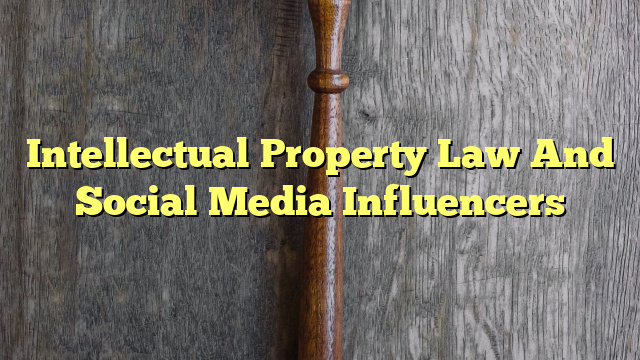Intellectual Property Law and Social Media Influencers
Table of Contents
- What are the intellectual property rights of influencers?
- Are social media handles intellectual property?
- How does social media affect intellectual property?
- Can I sue a social media influencer?
What are the intellectual property rights of influencers?
Social media influencers are individuals who have built up an online presence for promoting products, services, or ideas. They have a wide reach, and the potential to shape consumer opinion. As such, they need to be mindful of their intellectual property rights.
Intellectual property rights are divided into two main categories: copyrights and trademarks. Copyright law protects the expression of ideas and original works of authorship while trademark law protects distinctive signs and symbols used in commerce.
The primary intellectual property right of influencers is copyright. Influencers own the copyright to the content they create, such as videos and photos they post on social media platforms. This means that they have the exclusive right to reproduce, distribute, and publicly display their content.
In addition, influencers may also own the copyright to their name or pseudonym, depending on whether it is legally considered a trademark or not. If their name or pseudonym is considered a trademark, then they would have the exclusive right to use it to promote products, services, or ideas.
Are social media handles intellectual property?
The short answer is no. While social media handles are often seen as a way to identify the user, they do not meet the criteria for a trademark. Trademarks are distinctive signs used in commerce, and social media handles are not used for this purpose.
Furthermore, social media handles are not considered to be original works of authorship, and thus, they do not qualify for copyright protection.
However, the content that influencers post on social media is considered to be original works of authorship and thus, they are able to copyright it.
How does social media affect intellectual property?
In the digital age, social media has reshaped the way that people share and access content. With the ability to share images, videos, and other content with a wide audience, intellectual property rights have become increasingly important.
Infringement of intellectual property rights is a common problem on social media. Copyright infringement occurs when someone uses a copyrighted work without permission. Trademark infringement occurs when someone uses a trademark without permission.
The Digital Millennium Copyright Act (DMCA) protects copyright owners from infringement on social media platforms. The DMCA requires platforms to take down infringing content when they are notified of the infringement. Social media platforms also have their own policies in place to protect trademarks.
Can I sue a social media influencer?
Yes, you may be able to sue a social media influencer for infringement of your intellectual property rights. If an influencer is using your copyrighted work without permission, then you can bring a copyright infringement lawsuit. If an influencer is using your trademark without permission, then you can bring a trademark infringement lawsuit.
In addition, you may be able to sue for other causes of action such as misappropriation of likeness, invasion of privacy, or false endorsement.
It is important to note that the outcome of any lawsuit will depend on the specific facts of the case. If you are considering suing a social media influencer, it is advisable to speak to an attorney who can advise you on the best course of action.


Social media influencers must be aware of intellectual property laws.